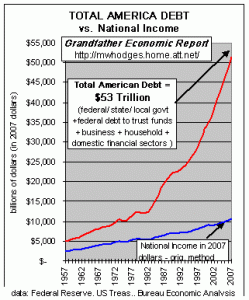It has become increasingly obvious that the central banks of the world will engage in whatever desperate actions are necessary in order to sustain and increase our already unsustainable levels of debt. The ridiculous idea of providing more credit to a financial system already imploding from oceans of debt seems to be the only solution that makes sense to our policy makers.
The alternative to keeping the credit engine going is to accept the economic pain necessary to restore sound finances. Since the short term financial pain would include very high unemployment, lower stock prices, frugal living standards, more credit write downs and more asset destruction, it is a certainty which path the political and monetary authorities will chose. Quantitative easing, bailouts and government borrowings are all certain to see immense increases. The risk of inflation and debasement of the currency brought on by these techniques is apparently viewed as preferable to the pain of deleveraging.
The false prosperity of the past 25 years has come from a parabolic increase in the national debt. One credit bubble after another in various asset classes have now burst leaving us with destroyed asset values and mountains of debt that can never be repaid.
Real national income has been stagnant for the last decade; attempting to address this problem by borrowing money to maintain living standards does not work long term since the interest costs eventually overwhelm a static income level as shown on the chart below. With interests rate essentially at zero the Federal Reserve is now forced to employ the unconventional methods that Fed Chairman Bernanke has spoken about in the past. The deflation we are now facing makes debt payments ever more onerous to the borrower. Debts too large to be repaid by definition will not be repaid – the only two options are to default or attempt to reduce the debt through inflation of the currency. The Fed has obviously chosen the later option.

Since the consumer represents roughly 80% of the economy, there will be massive efforts to put cash into the American consumer’s pocket. Additional income will not come from wage increases with the present high level of unemployment. Additional cash will not come from borrowing since the banks have thus far largely refused to lend to poor credit risk consumers. Additional cash will not come from lower rates since the Fed is out of bullets on rate decreases. Those who are financially responsible do not want to borrow or spend since they are trying to save to make up for the huge wealth destruction they have sustained over the past two years.
What is the solution on how to put more money in the pockets of those consumers most likely to spend whatever cash they receive? The proposed stimulus rebate program is presently the government’s only and preferred “solution” to over leverage and static incomes. The next move beyond this point will be to simply provide a way for the consumer to simply stop paying his bills without technically defaulting on the debt.
Since the largest monthly payment most consumers have is the mortgage payment, it is increasing likely that as the economy continues its downward spiral, the government will allow a mortgage holiday, as I have previously predicted. This once unthinkable action was actually proposed today by Gordon Brown in Britain, where consumers have distinguished themselves by becoming the most indebted citizens of the world.
As reported by the Financial Times, “Gordon Brown on Wednesday granted homeowners in financial difficulty the right to demand a two-year mortgage holiday, guaranteed by taxpayers, in a dramatic bid to underpin the housing market.” You can be certain that this program will eventually be applied to all mortgage holders in many countries.
According to the Federal Reserve, total home mortgage debt as of the second quarter of 2008 was $10.6 trillion, roughly equivalent to 80% of the GDP. Assuming an average interest rate of 6.5% on this mortgage debt, the cost to the government (who would pick up the tab) would only be $700 billion per year, oddly enough the same size of the presently proposed rebate program. Since we have already partly institutionalized the repudiation of debt through loan modification programs, this step is only a natural progression but applied to a wider number of people.
This program would no doubt be eagerly embraced and wildly popular with cash poor consumers. It would put cash into the pockets of those most likely to spend it, thereby helping the economy. The minority of those without mortgages may be upset until they accept the wisdom of “wealth redistribution” now being preached as a method of helping those in need.
My view is that we will all end up equally poor.
Speak Your Mind